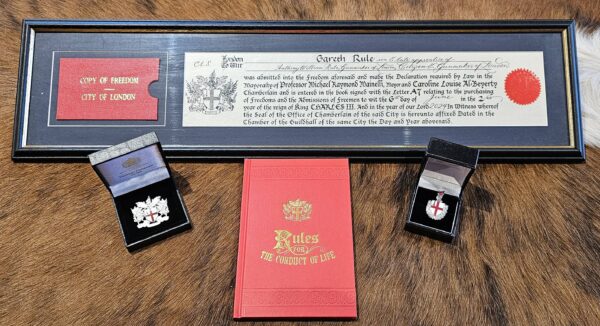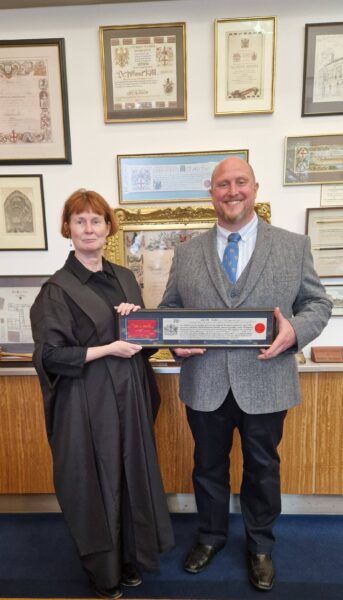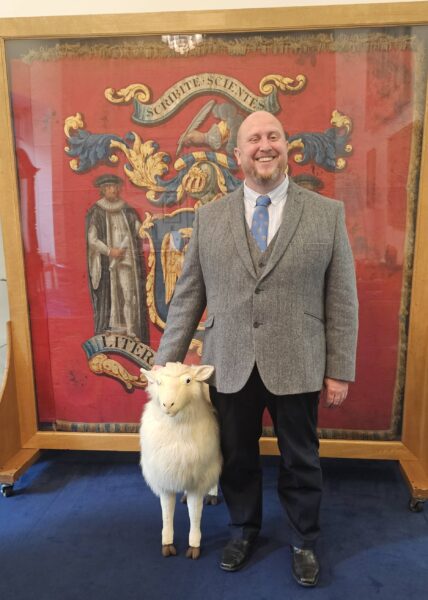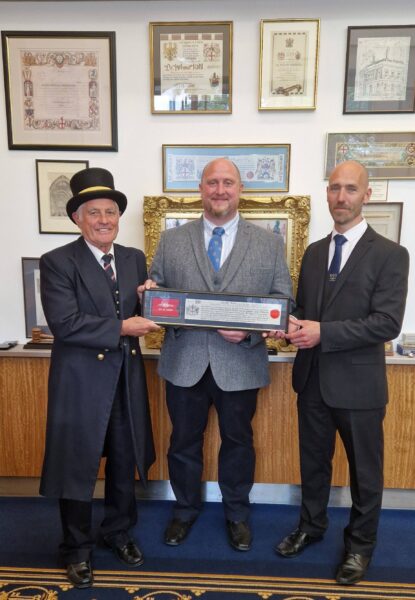

Following many years of servitude to the craft of gunmaking, Master Gun Stock Maker, Gareth Rule attended a ceremony at The Guild Hall in London to be granted The Freedom of the City of London. This prestigious honour recognises Gareth among may of his peers.
The ceremony took place in the Chamberlain`s court on the 6th June 2024, conducted by the Chamberlain of London. Gareth was required to read aloud the Deceleration of a Freeman and he signed the Deceleration Book, whereupon a document of sheepskin parchment called ‘copy of Freedom’ was presented together with a book entitled ‘Rules for the Conduct of Life’ and given to him. The ceremony concluded by the Chamberlain of the Court offering Gareth ‘the right hand of fellowship’ and greeting him as a ‘Citizen of London’.
The Freedom of The City of London is a very ancient tradition indeed and although most people, Londoners & non-Londoners alike, are aware of it, few understand its origins or present-day significance.
The origins of the Freedom date back to medieval times when craftsmen and women throughout Europe organised themselves into trade guilds which protected customers, employers and employees alike by checking standards of work, quality of goods, weights and measures, imposing server penalties on those who broke the rules. They trained the young and looked after members in age and infirmity. In the City of London these guilds, many of which still exist, became known as Livery Companies, They are not merely picturesque leftovers of history but living institutions, promoting and supporting their relevant trades and devoting vast sums of money to charitable & educational foundations. At present there are over 110 Livery Companies.
The City of London, then, as now, regulated the Livery Companies to a certain degree and demanded that all Liverymen be Freemen of the City as a method of control. The cost of Freedom in earlier centuries was comparatively high and for some years during the 14th Century Freedom fees were were a major source of income for the City, which is why, historically, the Freedom is administered by the City chief finance officer. In return, Freeman had certain valuable trading rights and privileges not available to non Freeman, for example, exemption from market & bridge tolls and – very importantly – only Freemen were permitted to vote or have say in the governance of the City.
Despite the lack of historical evidence, the picturesque legends concerning the Freedom of the City seem to be deeply engraved on the collective memory, so perhaps there is an element of truth in them. It was said that in the 12th Century stone bridge London Bridge was built of the back ‘on the backs of sheep’ – ie; paid for by the taxes on wool. As exemption from bridge, road & market tolls was a privilege of earlier Freemen, perhaps the claim might be ‘the Freeman’s right to drive flocks across the bridge without payment’. The right to set up market stall in the City without permission may also relate to this exemption. The right to go about the City with a drawn sword may also be folk memories of Freemen to be always ready to defend the City in case of attack.
Other commonly held beliefs include the right to be hanged by a silken rope, be married in St Paul`s Cathedral, be buried within the City, to be drunk and disorderly in the City without fear of arrest. If any of these ever did exist they certainly no longer apply and the only privileges relating to the Freedom are now purely of educational and charitable nature.
The Freedom of the City of London, despite so few privileges, continues to attract men & women from every walk of life who choose to identify with pride with that great community of people, the Citizens of London.
It maybe something to be proud of but not something to proclaim, for to use the Freedom for trade, advertising status or gain is strictly forbidden.
The Declaration of a Freeman:
I do solemnly declare that I will be good and true to Our Sovereign Lord King Charles the Third. That I will be obedient to the Mayor of this City; that I will maintain the franchises and customs thereof, and will keep this City harmless, in that which in me is. That I will also keep the King’s piece in my own person; that I will no know Gatherings nor Conspiracies made against the King’s piece, but I will warn the Mayor thereof; or hinder it to my power; and that all these points and articles I will well and truly keep, according to the Laws and Customs of this City, to my power.



